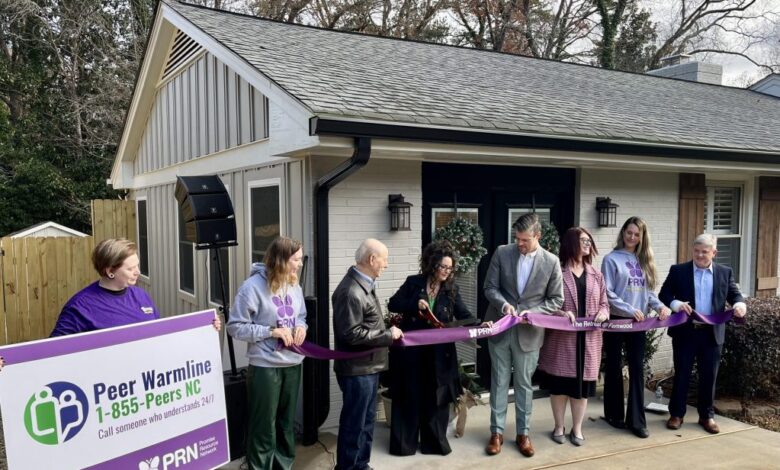Home-like respite stay is new alternative to psychiatric hospitalization in Raleigh


By Taylor Knopf
A new kind of mental health service is available in Wake County, and it offers a voluntary alternative to hospitalization for people experiencing mental distress.
It’s called a peer-run respite house; it’s the first of its kind in the Triangle area and only the third to open in North Carolina. It’s designed to provide a peaceful, home-like setting where people who are experiencing behavioral health issues can stay for up to 10 nights and receive support from trained peer support specialists who are on their own mental health recovery journeys.
Tucked away in a quiet wooded neighborhood off Glenwood Avenue in North Raleigh, the new peer-run facility is a welcoming departure from the clinical atmosphere of a psychiatric hospital or emergency department. The white-painted brick ranch-style home has natural wood shutters, and its interior is bright with accents of teal, light pinks and greens — carefully chosen from colors that have been shown to promote healing and recovery from trauma. The wood and wicker furnishings throughout the four-bedroom home are a marked contrast to the metal and plastic materials in typical psychiatric facilities.

The respite house in Wake County is operated by Promise Resource Network, a Charlotte-based nonprofit at the forefront of expanding peer-led mental health services in North Carolina, including a respite house in Charlotte and a statewide peer-run Warm Line. The funding for the Wake County facility comes from the $835 million for behavioral health appropriated by lawmakers in the 2023 state budget, with partners including the state Department of Health and Human Services and Alliance Health, the regional organization that manages public behavioral health dollars.
Those interested in staying at the respite house should call 919-307-8149 or email RespiteRaleigh@promiseresourcenetwork.org.
The 24/7 Peer-Run Warmline is available for those who want to talk to and receive support from someone who has lived with mental health issues and who has experience managing them. Call 1-855-PEERS NC.
The goal: to reduce the need for often-traumatic visits to emergency departments and psychiatric hospitals for people who feel they need help, but who might not need hospitalization. Research in other states has found that the presence of peer-staffed respite centers can reduce the need for emergency department visits for many people.
Broader options, building trust
Peer support specialist Elliott Brooks is excited for the new respite to open and start accepting guests in the new year. While in college, Brooks was involuntarily committed to a psychiatric facility, and now believes a stay at a respite house would have been much more healing. People who have experienced forced hospitalizations can become skeptical of the medical community and may prefer the support of peers during future mental health episodes.
One study conducted in-depth interviews with 40 young people who had been involuntarily hospitalized in which the majority of participants said they their experiences made them less likely to disclose future suicidal thoughts. Their distrust stemmed from their “perceptions of inpatient treatment as more punitive than therapeutic, staff as more judgmental than empathetic, and hospitalization overall failing to meet therapeutic needs,” the study authors wrote.
NC Health News previously reported that involuntary commitments — a legal tool that is supposed to be used as a last resort when a person is deemed to be an immediate danger to themselves or others — rose 97 percent from 2011 to 2021. NC Health News has interviewed dozens of families who have had a loved one involuntarily hospitalized in recent years, and they all wished for a more therapeutic experience with more options.
Peer-run respite centers were introduced in the United States in the 1990s, and Promise Resource Network’s respite is modeled after one in Massachusetts called Afiya. A peer-run respite center is operated entirely by people with their own stories of mental health recovery, trauma, hospitalization, incarceration, substance use, homelessness or some combination of these. People seeking the service arrive voluntarily, rather than being forced into treatment.

Unlike a psychiatric facility, respite guests can come and go freely and are not forced to miss work or school or community events. A respite house is not meant for those who need medical care, but for someone in distress who needs a calming space and some support.
Shift toward peer support
Historically, North Carolina health leaders have not always invited peer support specialists to crucial mental health service meetings. They have been slow to embrace peer-led mental health models, which have proven successful in other places. But the opening of the Wake County respite and plans for more peer-run programs signal a shift in their approach.
Kelly Crosbie, director of the NCDHHS Division of Mental Health, Developmental Disabilities, and Substance Use Services, has been a vocal supporter of the peer-led mental health model and called the opening of the respite house in Wake County “a celebration.”
Crosbie has said she wants to see more peer-run spaces, such as peer living rooms or day programs, and supportive places for those with mental health issues who are being discharged from hospitalization. The peer facility operated by GreenTree in Winston-Salem is one such place.
DHHS Secretary Kody Kinsley said that the department started using state funds to pay for peer support services in medical practices and hospitals around 2017.
“Peers embedded in other models have the ability to gain empathy and trust with patients, to help support them,” he said. “We did all the hard work with the federal government to convince the value proposition, and we got Medicaid to be able to pay for it.”
According to Kinsley, a big reason the peer-led model has been slow to advance is that the entire health care system is built around a “medicalized model” of paying for things.
“We’ve tried to build the track record and a credentialing process for peers to be able to make this meet muster with the federal government to say, ‘Yeah, you can pay for this as a service,’” he said.
Kinsley said a big shift happened last year when the state legislature allocated a historic amount of funding for investments in the behavioral health system. “The state money that we were able to get, thanks to Medicaid expansion, allows us to really supercharge that path. And so we have money like this to invest in capital buildings,” he said.

Promise Resource Network has also received funding from the state to open a peer recovery hub in Wake County that’s similar to the day center the organization operates in Charlotte, which offers classes and groups to support people in their mental health recovery and connect them with other community resources. Promise Resource Network plans to expand into Cabarrus County, said founder and CEO Cherene Caraco, and assist with the transition to community living initiative — a court-mandated order to move adults with serious mental illness out of institutions and into community settings.
Caraco, a trauma and suicide attempt survivor herself, is committed to delivering wellness and supporting people with mental health issues. She said her organization does not bill insurance and will remain a nonprofit with a “slow, but steady expansion” model.
“It’s one house at a time. It’s one program at a time. It’s one community at a time,” she said.
“There’s enough of what I call ‘big box behavioral health,’” Caraco said. “Every incentive is to serve more people and do less for them… It becomes about the bottom line, and that has served absolutely nobody.”
“We’re going to be the entity that comes along to create the alternatives that’s going to be the gap filler for the things that. Other people are not going to have the hardiness to do that,” she said. “We’re not going to make the money, but we’re going to make the impact. That’s why organizations like ours exist, and I’m good with that.”
Uncertainty at the federal level
While the outgoing Biden administration has supported several alternative recovery models and launched a novel Office of Recovery, health advocates have no idea what to expect in President-elect Donald Trump’s second term. Some mental health advocates are concerned about the security and longevity of their programs and fear the Trump administration will seek to cut funding or make changes that could undermine the progress made in recent years.
Kinsley, however, is hopeful. Under the first Trump administration, he recalled, there was a big commitment to the co-responder model, where mental health professionals accompany law enforcement officers to calls that involve a mental health crisis.
“That gives me some sense that things will be stable. I think what I worry about is, in the haphazard effort to purportedly find savings, they cut things that they don’t think are valuable, especially things that are nascent, like this,” Kinsley said gesturing to the new respite house behind him, “where we’re still building out the evidence.

“These folks don’t have as big of a lobby or as big of an interest group to advocate for their things as much as maybe organized medicine does,” Kinsley said. “And so that’s maybe my light fear, but I think that’s why we need to continue to just tell the story and continue to show the success.”
Caraco said health advocates are “rightfully worried” about a second Trump administration, arguing that it took the federal Substance Abuse and Mental Health Services Administration a long time to recover from Trump’s first presidency.
“There are some new things that have been birthed under the Biden administration, including an unprecedented Office of Recovery, and a strong push for things like harm reduction and peer support… things that we’ve been talking about and we know are effective,” Caraco said. “How open this new administration will be to either keep some of that or to continue the momentum, I think, is still to be seen.”
Trump’s picks for key federal health positions have raised concerns among health advocates, and the potential selection of Robert F. Kennedy Jr. to lead the federal health department is particularly worrisome to many. He has been skeptical of some pillars of a successful public health system.
Though uncertainty looms, Caraco wonders if Kennedy’s skepticism of the medical model could lead to a greater embrace of alternative programs, such as peer-led mental health services.
“With RFK not being a person who centers pharmaceuticals, could there be more of those conversations that could potentially lead to practice change, that could potentially lead to policy change? I don’t know,” she said. “So there’s a glimmer of hope and opportunity maybe in that.”
The post Home-like respite stay is new alternative to psychiatric hospitalization in Raleigh appeared first on North Carolina Health News.

